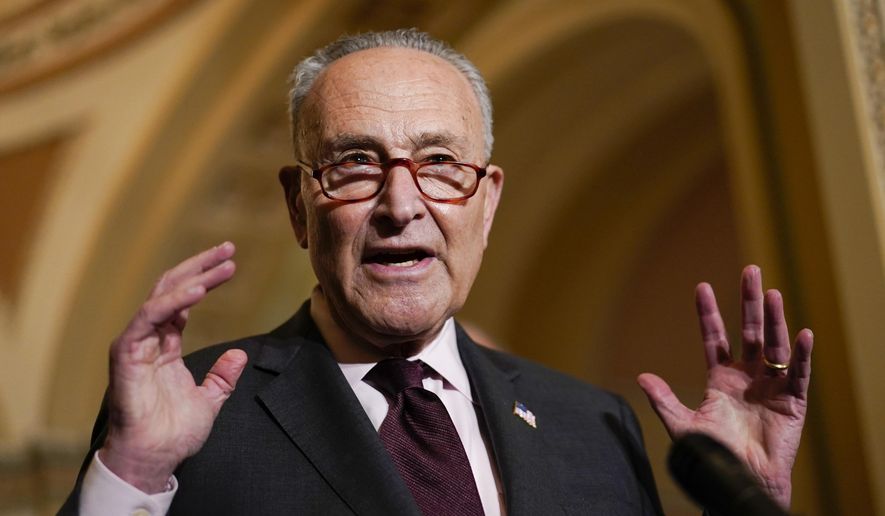Senate Democrats returned to Washington on Tuesday with their domestic agenda in shambles and searching for a way to save face.
Senate Majority Leader Charles E. Schumer is publicly pleading to continue work on President Biden’s $1.75 trillion Build Back Better Act.
Democratic leadership is stressing that the social welfare and climate change package is by no means dead despite intraparty opposition in a Congress with no margin for error.
“The negotiations will continue with members of our caucus and with the White House on finding a path forward on Build Back Better,” said Mr. Schumer, New York Democrat. “As I mentioned before Christmas, I intend to hold a vote in the Senate on [the bill], and we’ll keep voting until we get a bill passed.”
Despite the rhetoric, most Democrats are unsure how to advance.
Build Back Better, which garnered universal opposition from Republicans, was slated to pass along party lines using budget reconciliation. The process allows some tax and spending measures to avert the Senate’s 60-vote filibuster threshold and pass with a simple majority.
Party unity proved impossible on the package because Sen. Joe Manchin III, West Virginia Democrat, refused to support the bill. He cited concerns over budgetary gimmicks and said it could exacerbate inflation.
Mr. Manchin’s opposition effectively killed the bill. The Senate is split 50-50 between the parties, and Democrats hold tenuous control thanks to the tiebreaking vote of Vice President Kamala Harris.
The White House and Democratic leaders remain adamant that Mr. Manchin’s concerns can be alleviated and the bill can advance.
“I’ve talked to Sen. Manchin numerous times during the break,” Mr. Schumer said. “I believe the Biden administration will be having discussions with Manchin with his cooperation and participation.”
Mr. Manchin reiterated that his opposition to the bill remained steadfast.
“I’m not going to talk about Build Back Better anymore because I think I’ve been very clear,” Mr. Manchin said. “There are no negotiations going on at this time.”
Some Democrats say breaking up the bill and attempting to pass it piecemeal is the only way forward.
Sen. Edward J. Markey, a Massachusetts Democrat who authored the Green New Deal, said such a strategy should be used to tackle climate change with Mr. Manchin’s buy-in.
“Major climate and clean energy provisions of the Build Back Better Act have largely been negotiated, scored for 10 years and financed,” Mr. Markey said. “Let’s pass these provisions now. We cannot let this moment pass.”
Mr. Manchin acknowledges that breaking up the package’s climate components and passing them alone is viable.
“The climate thing is one that we probably can come to an agreement much easier than anything else,” he said. “There’s a lot of good things in there.”
That path is fraught with risk, however. A major stand-alone bill, such as one dealing with climate change, would take significant time and effort to pass.
It would also monopolize a large portion of the upcoming legislative season after taking into account fiscal deadlines, nominations and other must-pass measures. Complicating matters is that Democrats have only limited use of the reconciliation process.
“The problem is that due to the filibuster, we can’t vote on items individually,” said Rep. Alexandria Ocasio-Cortez, New York Democrat. “For the most part, the only major legislation the Senate can pass [with] 51 votes are reconciliation bills, [and] we only get two per year.”
Some lawmakers wonder whether the best solution is to pause consideration of Build Back Better and focus on other priorities.
Senior Democrats are hinting at a pivot from Build Back Better to changing Senate rules and pushing through a rewrite of the nation’s voting laws.
“We’re focused on voting rights, as we should be, and I think the White House is joining us in that effort,” said Senate Majority Whip Richard J. Durbin, Illinois Democrat. “And [we] clearly will return to Build Back Better as soon as that is done.”
Others insist that Democrats are not shifting strategy and the spending package is still a top priority.
“I don’t think we’re pivoting away. In fact, we met by recess over [the] phone, and we’re lining up a vote on that,” said Sen. Tammy Baldwin, Wisconsin Democrat. “I think everything’s still on the table.”
• Haris Alic can be reached at halic@washingtontimes.com.




Please read our comment policy before commenting.